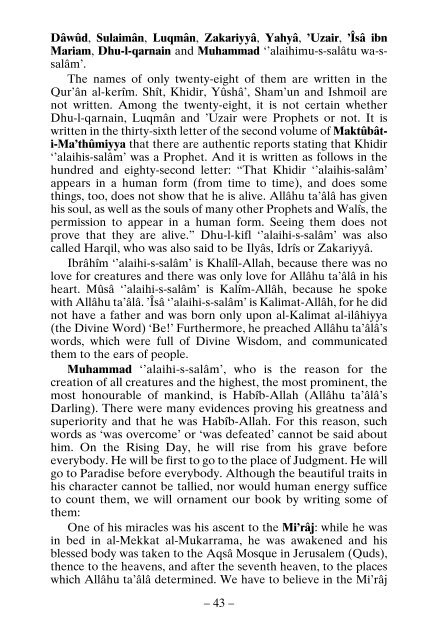Belief and Islam
BELIEF AND ISLAM star This work, Belief and Islam, originally was written in Persian under the title I’tiqâd-nâma by Hadrât Mawlânâ Khâlid al-Baghdâdî, a profound ‘âlim of Islam and a specialist in ma’ârif of tasawwuf. Hâji Faydullah Effendi of Kemah, a khalîfa of great walî Mavlânâ Mahmûd Sâhib, the brother of the author, translated the book into Turkish and named it Farâid-ul-fawâid which was printed in Istanbul in 1312 A.H.[1894]. Our bookstore had it translated again from the Persian original into Turkish and, some explanations and three chapters, published it with the title Imân ve Islâm in 1966. German, French and Arabic versions are also published by our bookstore. This book, explains five fundamentals of Islam, six fundamentals of îmân and the contemporary information about the matter and refutes those who are against Islam and those who are lâ-madbhabî.
BELIEF AND ISLAM
star This work, Belief and Islam, originally was written in Persian under the title I’tiqâd-nâma by Hadrât Mawlânâ Khâlid al-Baghdâdî, a profound ‘âlim of Islam and a specialist in ma’ârif of tasawwuf. Hâji Faydullah Effendi of Kemah, a khalîfa of great walî Mavlânâ Mahmûd Sâhib, the brother of the author, translated the book into Turkish and named it Farâid-ul-fawâid which was printed in Istanbul in 1312 A.H.[1894]. Our bookstore had it translated again from the Persian original into Turkish and, some explanations and three chapters, published it with the title Imân ve Islâm in 1966. German, French and Arabic versions are also published by our bookstore. This book, explains five fundamentals of Islam, six fundamentals of îmân and the contemporary information about the matter and refutes those who are against Islam and those who are lâ-madbhabî.
You also want an ePaper? Increase the reach of your titles
YUMPU automatically turns print PDFs into web optimized ePapers that Google loves.
Dâwûd, Sulaimân, Luqmân, Zakariyyâ, Yahyâ, ’Uzair, ’Îsâ ibn<br />
Mariam, Dhu-l-qarnain <strong>and</strong> Muhammad ‘’alaihimu-s-salâtu wa-ssalâm’.<br />
The names of only twenty-eight of them are written in the<br />
Qur’ân al-kerîm. Shît, Khidir, Yûshâ’, Sham’un <strong>and</strong> Ishmoil are<br />
not written. Among the twenty-eight, it is not certain whether<br />
Dhu-l-qarnain, Luqmân <strong>and</strong> ’Uzair were Prophets or not. It is<br />
written in the thirty-sixth letter of the second volume of Maktûbâti-Ma’thûmiyya<br />
that there are authentic reports stating that Khidir<br />
‘’alaihis-salâm’ was a Prophet. And it is written as follows in the<br />
hundred <strong>and</strong> eighty-second letter: “That Khidir ‘’alaihis-salâm’<br />
appears in a human form (from time to time), <strong>and</strong> does some<br />
things, too, does not show that he is alive. Allâhu ta’âlâ has given<br />
his soul, as well as the souls of many other Prophets <strong>and</strong> Walîs, the<br />
permission to appear in a human form. Seeing them does not<br />
prove that they are alive.” Dhu-l-kifl ‘’alaihi-s-salâm’ was also<br />
called Harqil, who was also said to be Ilyâs, Idrîs or Zakariyyâ.<br />
Ibrâhîm ‘’alaihi-s-salâm’ is Khalîl-Allah, because there was no<br />
love for creatures <strong>and</strong> there was only love for Allâhu ta’âlâ in his<br />
heart. Mûsâ ‘’alaihi-s-salâm’ is Kalîm-Allâh, because he spoke<br />
with Allâhu ta’âlâ. ’Îsâ ‘’alaihi-s-salâm’ is Kalimat-Allâh, for he did<br />
not have a father <strong>and</strong> was born only upon al-Kalimat al-ilâhiyya<br />
(the Divine Word) ‘Be!’ Furthermore, he preached Allâhu ta’âlâ’s<br />
words, which were full of Divine Wisdom, <strong>and</strong> communicated<br />
them to the ears of people.<br />
Muhammad ‘’alaihi-s-salâm’, who is the reason for the<br />
creation of all creatures <strong>and</strong> the highest, the most prominent, the<br />
most honourable of mankind, is Habîb-Allah (Allâhu ta’âlâ’s<br />
Darling). There were many evidences proving his greatness <strong>and</strong><br />
superiority <strong>and</strong> that he was Habîb-Allah. For this reason, such<br />
words as ‘was overcome’ or ‘was defeated’ cannot be said about<br />
him. On the Rising Day, he will rise from his grave before<br />
everybody. He will be first to go to the place of Judgment. He will<br />
go to Paradise before everybody. Although the beautiful traits in<br />
his character cannot be tallied, nor would human energy suffice<br />
to count them, we will ornament our book by writing some of<br />
them:<br />
One of his miracles was his ascent to the Mi’râj: while he was<br />
in bed in al-Mekkat al-Mukarrama, he was awakened <strong>and</strong> his<br />
blessed body was taken to the Aqsâ Mosque in Jerusalem (Quds),<br />
thence to the heavens, <strong>and</strong> after the seventh heaven, to the places<br />
which Allâhu ta’âlâ determined. We have to believe in the Mi’râj<br />
– 43 –

















